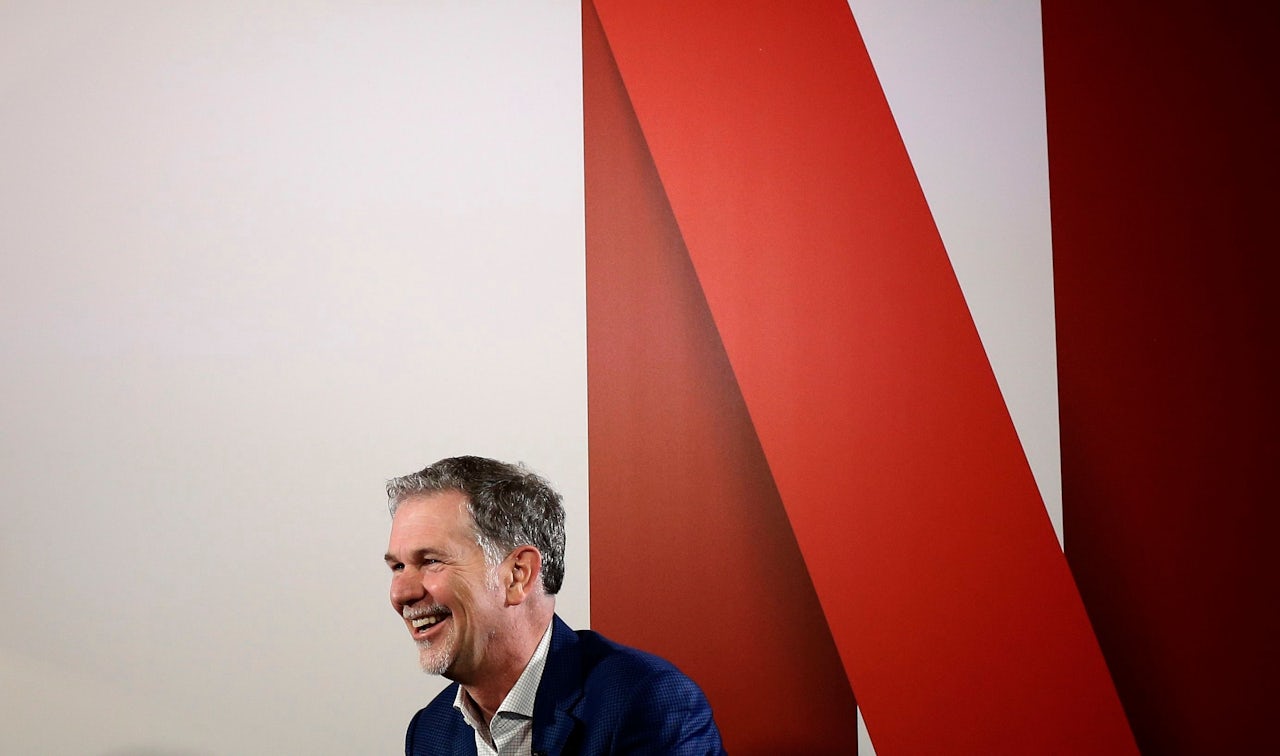The only thing I love more than a fresh cup of java in the morning is my Netflix. After a long day of work, there’s nothing better than curling up and watching a Marvel movie from 2013 or a critically-acclaimed program about teens who stop a school shooting with interpretative dance.
Which is why it’s a bummer that Netflix CEO Reed Hastings is such a coward. This past January, at the request of the Saudi Arabian government, Netflix spiked an episode of its comedy news show Patriot Act with Hasan Minhaj, owing to the subject matter, which was the Saudi Arabian government’s murder of Washington Post columnist Jamal Khashoggi. Speaking at the New York Times’s DealBook conference in New York earlier this month, Hastings affirmed the company’s decision in no uncertain terms: “We’re not in the news business,” Hastings said, according to Variety. “We’re not trying to do ‘truth to power.’ We’re trying to entertain… We don’t feel bad about [pulling the ‘Patriot Act’ episode in Saudi Arabia] at all.”
A few days ago, Netflix did the same thing again. A new (apparently good) documentary on the web streaming service about John Demanjajuk, a Ukrainian guard at Treblinka who was caught decades after the Holocaust while living a quiet suburban life in Ohio, drew the ire of Polish prime minister Mateusz Morawiecki.
“Central to [Morawiecki’s] complaint were maps seen in the series that place Nazi concentration camps such as Auschwitz within the borders of modern-day Poland,” again, according to Variety. “The U.S. streamer now says that it will amend the series by adding on-screen text, likely below the maps, to spell out the fact that the death camps sat in territory occupied by the Nazis.”
The basis for why Saudi Arabia and Poland would whine to Netflix is straightforward enough. Saudi Arabia wants to bury, as quickly possible, any memory of the time that it botched the Khashoggi cover-up, and had to eat international crow for a few months before most of the world moved on. Poland, meanwhile, is presently led by right-wing politicians who believe that Poland gets an excessively bad rap for helping to carry out the Holocaust, so much so that these politicians attempted last year to pass a law that could impose prison time on people who accused the Polish nation of complicity in the Holocaust.
If one really wanted to, you could make a by-the-numbers case for why Hastings has decided to cave to these foreign governments. The Sony hack, supposedly prompted by a movie making fun of North Korea, was a tremendous business catastrophe. And while Saudi Arabia and Poland are fairly small countries, Netflix needs to keep its slowing subscriber numbers as juiced as possible now that Old Media giants are rolling out things like HBO Max and Disney+. These are logical and convincing reasons that explain Reed Hastings’s moral abdication. Hollywood is filled with movie executives willing to do anything to keep access to foreign markets, such as displaying a map in a children’s movie that gives China territorial rights over the entire South China Sea. Netflix is just doing what everyone else does.
Hastings himself would probably like you to think this way. As a rule, corporate executives like to be thought of as people who make good business decisions, and that is what Hastings insists he has done. “We’re in the entertainment business,” he says, swatting away the work of “the perspicacious marketing department at Netflix’s documentary division,” as the New York Times described it, which as of 2017 seemed to understand its role as selling Netflix’s brave support for a largely undervalued medium.
“Just because a person doesn’t go see a documentary on a Friday night, it’s not a reflection on the film; it’s just a reflection that maybe a documentary isn’t a film that a couple is going to want to see on date night,” Lisa Ishimura, the Netflix executive in charge of documentary programming, told the Times. “What we’ve discovered is that we can elevate storytelling and bring it to a global platform and create a cultural moment.”
Here’s how Reed Hastings and other C-suite media types might present this bargain: If you want to see things like a five-part documentary series about a Nazi camp guard discovered living in Ohio, then accept that once in awhile, we may make a decision that you don’t like. Sometimes we’ll cancel a show you like, other times we may have to preemptively self-censor in, say, India, because of the country's nationalist ruling government. This is the cost of living in a society, or something.
The actual truth of the matter is much less complicated. Netflix will do what it can to get you to sign up or keep paying for Netflix, and one of the ways it does that is by mimicking the “content bundle” that people have traditionally gotten through paying for cable, subscribing to a newspaper, and so on. All those dollars spent on “media” are in competition with one another, especially now that the business of advertising is less viable than it ever has been with the dominance of Facebook and Google. The costs of media subscriptions get higher as other sources of revenue dry up, and most people’s wallets aren’t growing any larger.
For awhile, Netflix has believed that documentaries with the moral force to create a “cultural moment” are one way to draw in subscribers and perhaps even viewers. It distinguishes Netflix, and it is one more reason that you should give it your money. Virtue can do wonders for entertainment (and news) marketing. But actually practicing virtue requires doing virtuous things. If you’re unwilling to do that? It’s called cowardice.
